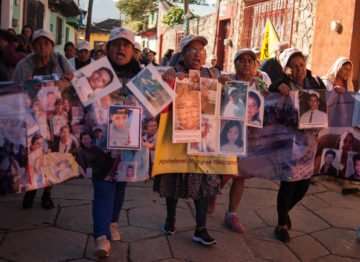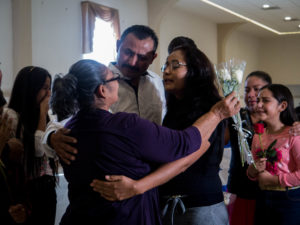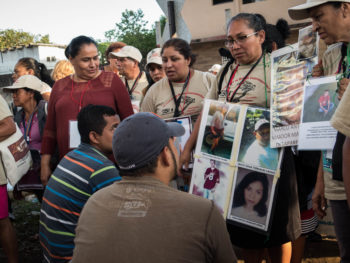 Who are we? Central American mothers! Who are we looking for? Our children! Why do we look for them? Because we love them! What do we want? JUSTICE!
Who are we? Central American mothers! Who are we looking for? Our children! Why do we look for them? Because we love them! What do we want? JUSTICE!
They hold hands and form a circle in the small church in Marín, Nuevo León. The Caravan of Central American Mothers of Missing Migrants has come to this northern Mexico town precisely for what is about to happen. It’s the reason for the existence of the yearly caravan—a reunion between mother and child, long separated by forced migration and now reunited by this group’s work.
Thirty-one years ago, Lilian Alvarado de Romero watched her two children, Dalinda, 9, and Salvador, 7, leave their home. She sent them north to keep them safe during the armed conflict in El Salvador, where the violence had already claimed the lives of several of her relatives. Since that day, she hadn’t seen them or heard from them.
When the two see their mother walking toward the circle, Dalinda cries “Mama!” They embrace and cry ,and we all cry. The grandmother meets her grandchildren for the first time. The broken circle is repaired. The caravan finally continues on its way, leaving the family together, eager to fill in the decades of separation.
In its fifteenth year, the Caravan of Central American mothers brought together six families like Lilian’s: A son who left Honduras as a teenager to find a better future and lost contact with his mother for more than three decades. An indigenous father from Guatemala who found his daughter in a prison in Reynosa, imprisoned 6 years without sentence for a crime that she did not commit. A mother who finds her son in Coatzacoalcos, and a sister who meets her longlost sister in Tuxtla Gutierrez. In total, the caravan has chalked up 315 reunions in its 15 years.
 This year, 38 relatives of missing migrants traveled through 14 Mexican states, along with members of the Mesoamerican Migrant Movement, press and six migrants’ rights activists from Spain and Italy — natural allies of the movement that is now global. The caravan route follows the changing migratory routes through Mexico. The mothers stay in the same shelters that receive their daughters and sons. They follow the tracks of the trains that are the arteries of migratory flows. They talk to people in public plazas and to members of the broad network in Mexico that dares to support Central American migrants who have been increasingly criminalized, persecuted and exploited.
This year, 38 relatives of missing migrants traveled through 14 Mexican states, along with members of the Mesoamerican Migrant Movement, press and six migrants’ rights activists from Spain and Italy — natural allies of the movement that is now global. The caravan route follows the changing migratory routes through Mexico. The mothers stay in the same shelters that receive their daughters and sons. They follow the tracks of the trains that are the arteries of migratory flows. They talk to people in public plazas and to members of the broad network in Mexico that dares to support Central American migrants who have been increasingly criminalized, persecuted and exploited.
Some of the mothers are searching for children who left decades ago; others lost their loved ones just months ago. After the wave of refugees during the armed conflicts and civil wars, Central American countries now have moved to expulsion due to structural violence and political crises. Peace did not come to the places they come from and new threats emerged. No law or wall or armed forces deployed against them can stop people fleeing death and a life with no future.
Alongside the mothers, there are also fathers, brothers, siblings and offspring. The Caravan doesn’t discriminate or exclude, but its name -The Caravan of Central American Mothers–is more than symbolic. The fact is that the majority of family members who search for disappeared migrants and continue searching over the years and decades are mothers. In the face of devastating loss, if you tell them that they have to go on with their lives – unsolicited advice that they often hear – they will answer that searching for their children is their life. The absence of a daughter or son is not something that remains in the past or is ever overcome.
There is also another reason that explains the unwavering commitment of mothers — the personal and social transformation that is achieved through grassroots organization. Everyone in the group has become an eloquent spokeswoman for her cause and a community leader. They have formed collectives in their countries — Honduras, Guatemala, El Salvador and Nicaragua — that work to continue the search and pressure governments. Being women, their empowerment is doubly challenging to a global capitalist system that dictates that the poor, the excluded, the different and women have a place below others and should not move from there.
The mothers have learned to speak in public without fear and without censor. They’ve learned to navigate complex government laws and institutions designed to simulate action and hinder progress toward truth and justice. They draft demands, fill out forms, invent slogans, do public relations in the public squares where the display photos of their missing children. They know their rights and demand them. In the shelters and community centers that the Caravan visits in its search, the people who receive the caravan repeat the same tribute, with variations: ‘You are the defenders of life in the face of a system of death.’
 The most important form of empowerment for these mothers is to develop the power to search for and find their children. They rae convinced of this power — if not, they wouldn’t have left their homes and communities to travel the width and breadth of Mexico. They have learned that this is a collective power, that they must organize to be able to search effectively for their loved ones and to be able to stand up to the powers against them– the merciless power of organized crime that sees migrants as the spoils of their turf wars; the power of governments that enforce anti-migrant policies that create a black market of human beings, that cary out extortion of migrants, that beat and separate families in the name of the law; and the patriarchal power that sees in the bodies of migrant women another property for their benefit. There are many powers arrayed against the mothers, but also many powers they have inside and on their side.
The most important form of empowerment for these mothers is to develop the power to search for and find their children. They rae convinced of this power — if not, they wouldn’t have left their homes and communities to travel the width and breadth of Mexico. They have learned that this is a collective power, that they must organize to be able to search effectively for their loved ones and to be able to stand up to the powers against them– the merciless power of organized crime that sees migrants as the spoils of their turf wars; the power of governments that enforce anti-migrant policies that create a black market of human beings, that cary out extortion of migrants, that beat and separate families in the name of the law; and the patriarchal power that sees in the bodies of migrant women another property for their benefit. There are many powers arrayed against the mothers, but also many powers they have inside and on their side.
The families of disappeared Mexicans, who will soon launch their own national search effort with the Fifth National National Brigade to Search for the Disappeared, have a motto: “Looking for them we find each other”. It applies to the Central American mothers’ caravan as well. In addition to the friendships that are made, which on this year’s caravan were a source of love and joy and unity, they find that another world is possible. As the founder of the caravan and of the Mesoamerican Migrants Movement, Marta Sánchez, says, that world is a world of solidarity and communion that restores belief in the future, despite the pain of the present–a pain that no one knows as closely or as deeply as a mother who has lost a child.



